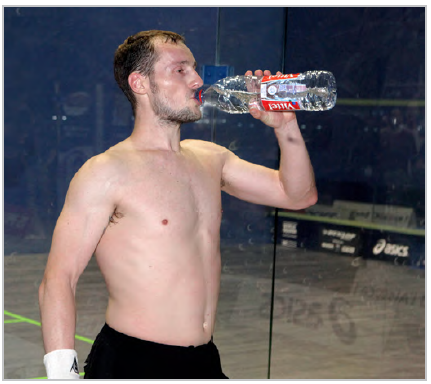By Candace H. Chemtob, MS, RD, LD, CSSD
For an athlete, knowing the difference between “fact and fiction” could have a significant impact on performance, and health. This article will cover some widely held sports nutrition myths.
Myth 1: You can rely on thirst to avoid dehydration. Maintaining fluid balance is no small order and involves the brain, hormones, and specialized neurons that detect changes in blood volume and concentration. Ultimately, this complicated system triggers the drive to drink fluids—thirst—when the body is approximately 1% dehydrated (fluid loss equal 1% of body weight). Thirst is simply a “warning signal,” as 1% dehydration does not pose a health risk, nor is athletic performance diminished. However, it is best to heed this warning because as dehydration approaches 2% or more, your health, mental acuity, and athletic performance can deteriorate. Athletes should have an individualized fluid replacement plan versus relying on thirst.
Myth 2: Plain water is the most effective rehydration fluid. The rule of thumb for fluid replacement after training or competition is to consume 1.5 times the amount of weight lost. For example, to replace a loss of one pound (1 pound= 16oz), 24oz of fluid are required to rehydrate. Drinking plain water alone is not an effective way to rehydrate. Essentially drinking plain water “dilutes” blood and has the unintended effect of sending a message to the kidneys to excrete more water. To hydrate with water, please add 1/4 tsp salt per 32 ounces of water, or simply eat food (nearly all food contains sodium naturally) while rehydrating.
Myth 3: Coffee is “bad”. For decades, coffee had a bad reputation. Being considered a diuretic (increases fluid losses) was of concern to athletes. But there is good news for coffee loving athletes! Researchers at the University of Connecticut analyzed ten studies and concluded that caffeinated beverages were nearly as effective as water to rehydrate. Additionally, recent research has shown that drinking coffee can have some health benefits. Moderate coffee intake was found to decrease the risk of type-2 diabetes, Parkinson’s disease, and depression (Nurses’ Health Study). Most experts now agree that moderate coffee intake, up to 400mg per day, is safe (NIH).
Myth 4: Coconut water is a sports drink. First, to clarify, the ACSM recommends sports drinks for prolonged exercise (more than one hour) to replace fluid/electrolyte losses and to provide carbohydrates as an energy source. Otherwise, under less strenuous conditions, drinking water is sufficient. Secondly, although coconut is “natural,” its electrolyte contents may not be sufficient to replace those lost in sweat. Specifically, coconut water tends to be low in sodium, the primary electrolyte lost in sweat, and can contain insufficient amounts of carbohydrates as well.
Myth 5: Herbal supplements are natural and therefore must be safe. Wrong! First of all there are many natural substances that can kill people, like arsenic, ricin, and cyanide. Take herbal or nutritional supplements at your own risk! Neither the USDA nor the FDA tests nutritional supplements, “natural” or not, prior to reaching the marketplace. Herbal supplements have been found to contain mold, arsenic, and dangerous medications. Case in point, The New York Times reported that twenty percent of all liver failure in the U.S. is caused by contaminated nutritional supplements (December 2013).
The job of a sports dietitian, and of a dietitian in general, is to help clients sift through volumes of misinformation, and develop an evidence-based, results-driven nutrition strategy. If you don’t have access to a dietitian, here are some basic “rules” that may help you find accurate and reliable nutrition information:
1. If it sounds too good to be true, it probably is;
2. There is no such thing as a quick fix that will give you longterm results;
3. Unfortunately, the nutrition messages that sell are “exaggerated,” so ignore 90% of what you see or hear on TV, at the health food store, or in advertisements;
4. Obtain information through reliable sources, such as the NIH (or anything that ends in “.gov”), from universities (e.g., Mayo Clinic) and medical journals that are “peer reviewed” (e.g., New England Journal of Medicine); and
5. Check out eatright.org (website of American Academy of Nutrition and Dietetics).






